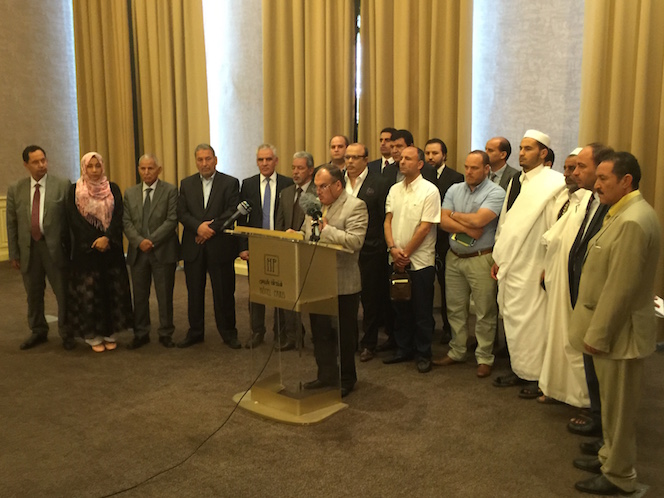By Libya Herald staff.

Tunis, 30 August 2015:
Time is running out for the international community to help solve the Libyan crisis, a . . .[restrict]group of Libyan politicians, businessmen and activists warned European ambassadors to Libya today.
At a meeting in Tunis, the 24 Libyan figures, several from Misrata but also including seven members of the House of Representatives who have been boycotting its proceedings, told the European diplomats that the UN-brokered Dialogue negotiations were the only way forward to solve the Libyan crisis but that the international community had to put pressure on all involved in them to come up with a result now.
The situation was so urgent, the Libyans said. If necessary, the Dialogue would have to finish its work and produce a government of national accord without the GNC. A deal was vital, they insisted.
Without it, HoR member from Nalut Salem Ignan told the Libya Herald there were real fears about Libya’s survival.
Former deputy communications minister Mohamed Benrasali, another of the participants at the meeting, similarly spoke of dire consequences for Libya if there was further delay in the Dialogue.
Leon has said that a government of national accord should be agreed by 20 September and operating by 20 October. That is just a day before the mandate of the House of Representatives (HoR) expires. Under the planned Libya Dialogue agreement, this would be extended by up to two years by an HoR amendment to the Constitutional Declaration being made with the approval of the UN and therefore seen as legitimate.
“We can’t wait till October” for a government of national unity to be created and installed, Benrasali said. That would be too late. There were real dangers that Libya would by then have been drawn in different directions – by public opinion fearful at a vacuum ahead and by the General National Congress (GNC) in Tripoli, the HoR in Tobruk and the military making alternative plans.
The UN had to intensify it pressure on all sides in the Dialogue to come up with a fair solution now, an eight-point statement from the 24 said.
Stating that they blamed, “in part” the UN and the international community for the crisis in Libya, they called for a strict timetable for the Dialogue, which had to be adhered to. The five-member presidential council (which will include the prime minister and two deputy prime ministers) had to be created as soon as possible so that it could form a government.
The statement also said that the Dialogue must give special emphasis to solve the crises in Benghazi and the south of the country and that there needed to be international humanitarian aid for all areas affected by fighting as well as support for the displaced.
Among those taking part, Mohamed Raied, one of Misrata’s boycotting HoR members, called for any controversial figures in the country to be excluded from any role in the new administration. He and Ahmed Al-Abbar, a political activist from Tripoli, also called for heads of sovereign institutions (such as the NOC and the Central Bank) to be set aside until new appointments could be made by the government of national accord.
All the Libyan participants pointed out that the HoR had to include all the boycotters; several also indicated that it would have to address the issue of decisions taken by the legislature so far.
The European diplomats, who had invited the 24 Libyans to Tunis, expressed their own support for the dialogue, agreeing that an outcome was urgent.
Progress has been made, said UK ambassador Peter Millett, but there were several crises in Libya – political, economic, social, humanitarian and, especially with the presence of the Islamic State, security as well. The international community was ready to give “a package of support on the security side” to the new government once formed and other support to the Libyan people, he added. But the Dialogue had to reach a conclusion. It was “absolutely” urgent, he said.
“We need an agreement as soon as possible”. [/restrict]







